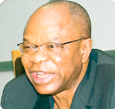Nigerians have not ceased to call for the resignation of the Chairman of the Independent National Electoral Commission, Prof. Maurice Iwu, over the disappointments that trailed the April 2007 general election. But then, it is a huge joke, because Iwu is not ready to resign, no matter what. At least he has told us so.
It is untypical of a Nigerian public office holder to resign from office, even when it is a face saving device; except for someone like Dr. Ngozi Okonjo-Iweala, who resigned her appointment shortly after her unceremonious redeployment to the Foreign Affairs Ministry, all the way from the Ministry of Finance. Ex-House of Representatives Speaker, Mrs. Patricia Etteh, on the other hand, was forced to tender her resignation when it was obvious that the nation was at a standstill as a result of her refusal to step down, following her indictment over a financial issue. So, the average Nigerian does not voluntarily leave office before the end of his tenure.
Back to INEC helmsman. Not only is Iwu not resigning, he is taking on a very annoying stance in defending his continued stay in office. He was quoted to have said in a recent interview that nobody could sack him. His position, he maintained, is one that could be terminated only by impeachment.
It is understandable if Iwu tucks himself within the armour of the Constitution and insists on not resigning if only by doing so would have made a point. Iwu reportedly faulted the American elections on the basis that Nigerian elections were better. That shows how much the man believed in the commission he heads and his own ability to steer that place to an electoral El-Dorado. Maybe his faith will make the INEC whole. Maybe not.
Other arguments in favour of Iwu are that, so far, nobody has asked the registrar of JAMB to resign because of examination malpractices, and that, that being the case, why should anyone ask Iwu to leave office because of malpractices he couldn’t help?
As an individual, I have refrained from blaming Iwu for the malpractices that characterised the 2007 general election, because he could not have personally supervised or vetoed rigging in all the 36 states. The resident commissioners in each state should be held responsible for the things that went wrong under their watch, even though, so far, nobody has called for their resignation.
In states like Edo and Ondo where the elections they conducted have been upturned, the resident commissioners have not resigned and they are not likely to.
Yet, by the law of how things work, the buck stops at Iwu’s table. Even if he knows nothing about electoral malpractice in a state, he is going to be blamed for it because he is the man in charge. It is dishonourable for a leader to claim that things that went wrong on his watch were not his fault. After all, if the election had been otherwise, Iwu would have soaked in the credits just as well. And if the call for him to resign had been for him to be the life chairman of the commission, perhaps he wouldn’t have been quoting the Constitution. But then, I digress…
Senators have even come out to confirm that Iwu is invincible –– he cannot be sacked without their assent. And from the look of things, he is not likely to get the sack, either from the Presidency or the Senate. Maybe these are things that embolden Iwu to continue to stay in office, despite the moral issues involved.
He has continued to defend the elections as the best thing to happen to Nigeria; he is the saviour of Nigeria at a very crucial time when the country needed to transit from civilian to civilian rule. Iwu, so far, has not accepted that the election is fundamentally flawed.
Arguments in Iwu’s favour have tried to absolve him of the large scale malpractices that went on in the election. For instance, he didn’t commission thugs to snatch ballot boxes; he was not the one who announced fictitious results in the states where they were; he was not responsible for the voting not taking place in some places, etc., etc.
Well said and logical arguments, except that it does nothing to assuage the anger of Nigerians whose faith in the polls were violated. Those that stood hours on end to exercise their civic rights are pained that the man they elected into office was denied and the mandate given to a less popular choice. Those in communities where they waited endlessly for INEC officials to arrive with voting materials and they failed to turn up are angry that votes were allocated to their communities, without their consent of course. Nigerians are angry because, rather that admit that a lot went wrong in 2007, Iwu still scores the 2007 election very high.
I am sure that if Iwu were in the shoes of the people, he would know what it means to vote and have some higher power deny you of the right to choose your own person. He would know where those calling for his resignation are coming from and he would stop accusing them of mischief. Neither will he boast that by virtue of the Constitution, he is invincible.
While what is done cannot be undone, the Ekiti rerun election is a chance for Iwu to prove that yes, he can. It is another chance for both the commission he heads and him as well. This time, he should go beyond rhetoric and restore faith in INEC. Nigeria is a country that is still learning to conduct elections properly and one fine tomorrow, we will get there. But aiding and abetting electoral malpractice will get us nowhere.
When President Umaru Yar’Adua won at the Supreme Court, Iwu was reported to have jubilated that INEC had been vindicated. This is unhealthy and unbecoming of a man who ought to be an umpire. If an election was fraught with malpractice, it won’t detract from his integrity if he admits it. There is no point stretching and tailoring evidence to justify an election so as to give a measure of credibility to INEC. In the long run, it adds nothing to the body. People are not so easily deceived. Even worse is that it sets the country back by many paces.
Since Iwu is going nowhere, then he should improve public perception of INEC. This time, let Maurice Iwu go to Ekiti and personally supervise the election; he should assess the available facilities before the D-Day and monitor the elections to see that the votes are properly counted. Let him monitor and act like an unbiased umpire he should be. If the AC candidate wins, it will help his integrity that INEC did not justify its mistake by giving the mandate to someone else. If the PDP candidate wins, let the process be as transparent and incontrovertible as possible.
The Ekiti election will determine more than just who is governor – it will help the cause of our democracy; and Iwu stands on the threshold of history to either make this happen or to send us groping in darkness for another four years.
THE PUNCH
By Abimbola Adelakun
4-Mar-2009




